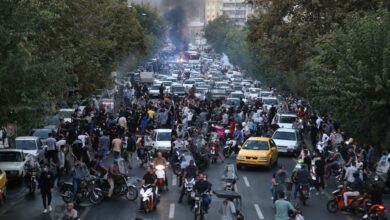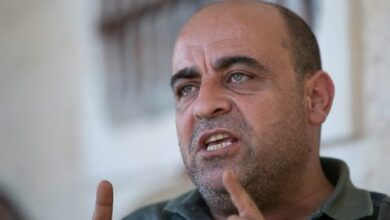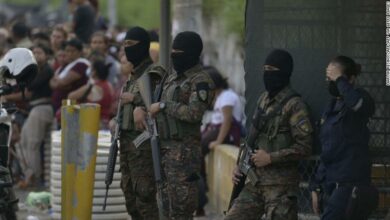A group opposed to military trials for civilians met with members of the ruling Supreme Council of the Armed Forces (SCAF) on 13 June; they were promised that the military would revisit cases of civilians who received military sentences since the SCAF took power in February.
The military also said it would begin investigating allegations of human rights violations by military police.
Military representatives were reluctant to admit to torturing protesters, but confirmed to the group that the widely criticized virginity tests, which female protesters arrested on 9 March say they were subjected to, did happen. The military called it a normal procedure, according to activists who are part of the group.
The group, called No to Military Trials of Civilians, has been campaigning against military trials for civilians since February. Last week they received an invitation from the ruling council for a meeting on Monday to present their demands.
The meeting consisted of No to Military Trials of Civilians members Mona Seif and Ragia Omran, in addition to novelist Ahdaf Soueif, human rights activist Ahmed Ragheb and two protesters who had military trials and were later released.
Members of the group said they accepted the invitation reluctantly, but were satisfied with it as a first step. They are still somewhat skeptical that the SCAF will follow through on its promises.
“We’ve got nothing but promises, but we’ll keep pushing, and we’ll bring up those promises if they don’t come true,” said Seif.
The group delivered two reports to the military, one concerning military trials of civilians and the second concerning accusations of violations committed by military police.
The activists say they believe the SCAF is already aware of their grievances and demands, but they accepted the invitation in order to pressure the military.
Since Egypt's military took control of the country in February, approximately 7000 civilians have been sentenced in military trials, including activists who were detained in protests and others who were tried with criminal charges.
In May, the military released more than 300 protesters and gave them suspended sentences. Some of the released were undergoing investigations, while others were serving three- to seven-year military sentences.
During their meeting with the military, the activists demanded that the released protesters be retried to rid them of the suspended sentences which, even though they don’t involve jail time, imply guilt, said Omran, a lawyer.
The activists say they also demanded the retrial of four unreleased protesters who continue to serve military sentences ranging from six months to five years.
Mohamed Adel, a banker, was arrested on 28 January and received a military sentence of five years. The military issued a statement in March announcing his retrial, but according to his lawyers and family, no official steps were taken in that direction.
While releasing the majority of the detained protesters was seen as a positive step, it relieved the public pressure to release the remaining thousands of civilians who are less well-known but still are serving military sentences.
“A very small number of those detained gets attention, and it’s usually the activists and protesters, but there are thousands of poor people in there who don’t have anyone to campaign for them,” said Seif, who said the No to Military Trials for Civilians group will continue its fight until the last civilian with a military sentence is released.
Seif said that military representatives agreed to consider the group’s proposal to refer the cases of all civilians with military sentences to a civilian judge to review them and give his recommendations.
The group asked the military to release a statement within a week pledging not to refer any more civilians to military courts. They specifically discussed the case of the five workers from the Petrojet Company who are currently facing military trials after striking in front of the petroleum ministry.
Due to a lack of open information and transparency, the group asked the military for full lists of those that have been tried in military courts since the start of the protests. To date, the military has released no information.
When they raised the issue of military police abuses, Seif says that the generals responded with “a poker face,” without admitting or denying the incidents while asserting that there is no reason for military police to abuse civilians.
Protesters who were arrested in Tahrir Square on 9 March and detained in the Egyptian Museum for six hours before being referred to military prosecution have presented evidence and testimonies of severe torture by military police.
The group offered to meet with the military again next week with people who have been tortured by the military police and are willing to give live testimonies. In the meantime, the group announced that it will be filing reports of military police violations to the military prosecution throughout the week to strengthen its claims.




